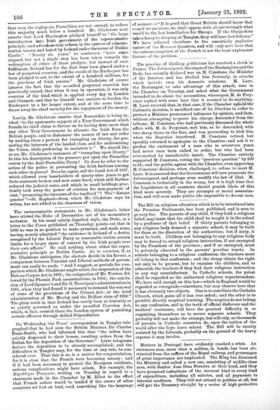The unwarrantable statements in Mr. Gladstone's letter have stirred the
Duke of Devonshire out of his momentary seclusion. In his usual calmly dignified style, the Duke, in a letter to the Times published on Thursday, points out that in 1886 he was in no position to make promises, and made none, having merely admitted " the existence in Ireland of a desire, recognised by the Liberal Party as reasonable within certain limits, for a larger share of control by the Irish people over their own affairs." He said nothing about either the repre- sentative principle or Dublin Castle. As to coercion, if, as Mr. Gladstone anticipates, the electors decide in his favour, a comparison between Unionist and Liberal methods of govern. ment can easily be made. " And I suggest, as periods for cora. parison which Mr. Gladstone might select, the suspension of the Habeas Corpus Act in 1881; the resignation of Mr. Forster, fol- lowed by the Phoenix Park assassinations, in 1882; the conclu- sion of Lord Spencer's and Sir G. Trevelyan's administration in 1885, when they had found it necessary to demand the renewal of some of the provisions of the Crimes Act ; or the brief administration of Mr. Morley and the Belfast riots of 1886." The plain truth is, that Ireland has rarely been so leniently or so quietly governed as under the so-called Coercion Act, which, in fact, created there the London system of punishing certain offences through skilled Stipendiaries.


































 Previous page
Previous page